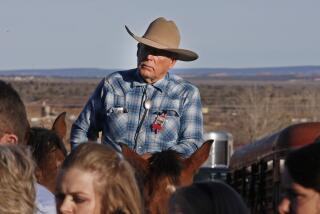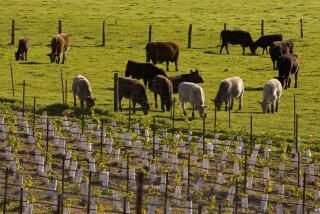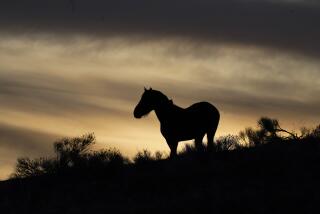Horseback protest targets BLM, but environmentalists say whoa
They’re a dozen men and women riding horseback on a modern-day cross-country cattle drive, but with fistfuls of petitions instead of a herd of steers. Their wide-brimmed hats tipped low against the sun’s glare, they’re riding from Bodega Bay, Calif., to Washington.
They call themselves the “Grass March Cowboy Express” and they want the Bureau of Land Management to remove “an abusive federal employee” and “end BLM tyranny.”
The group contends that Doug Furtado, manager of the bureau’s Battle Mountain District, has unfairly blocked their legal right to graze their cattle on federal land in central Nevada.
But environmentalists have lashed out at protesters as a selfish, entitled group with no business running private cattle on public lands, especially during years of prolonged drought.
Six months after Nevada rancher Cliven Bundy’s well-publicized face-off with bureau officials over grazing rights on public lands north of Las Vegas, tension still exists between many cattlemen and the federal government.
Bundy in April attracted an army of self-proclaimed citizen militia members, many of them with semiautomatic weapons, who challenged officials who had moved in to remove hundreds of cattle from federally administered land. The bureau later called off the roundup, but federal officials promise that Bundy could be held accountable in the courts for more than $1 million in unpaid grazing fees.
Organizers of the Cowboy Express, which started in Bodega Bay in Northern California on Sept. 26, say they have no connection to Bundy. They just want the Bureau of Land Management off their backs.
But in a message to supporters, one nonprofit criticized the riders for singling out Furtado because he had “the temerity to order drought-induced reductions in commercial grazing.”
The group Public Employees for Environmental Responsibility also mocked the protesters for their use of the hard-bitten cowboy image often seen in cigarette commercials.
“The Marlboro Man evoked iconic cowboy imagery to sell cancer sticks,” it said in a news release. The “stunt called the ‘Cowboy Express’ also seeks to harness this romantic image to mask deeply selfish and destructive ends.”
Katie Jones, a central Nevada horse trainer on the protest ride, said her group was being supported by ranchers along the way, many of whom joined the ride for a few miles.
She said the group earlier this summer did a ride within Nevada, from Elko to Carson City, to present petitions to Gov. Brian Sandoval. That’s when they decided to make the 2,800-mile cross-country trek.
Speaking this week from Russell, Kan., Jones said the group was traveling 180 miles a day and planned to arrive in Washington on Oct. 16 to meet with Western lawmakers. Along with calling for Furtado’s dismissal, she said, the group wanted to publicize the plight of Western ranchers to people on the East Coast “who have no idea we’re out there.”
She criticized the harsh tone of environmentalists.
“There’s no need to cut us down like that,” said Jones, 32, whose husband is also on the ride. “We’re as homegrown as they come. We produce food for people. I just wish they’d open up their eyes to that.”
Kirsten Stade, advocacy director for Public Employees for Environmental Responsibility, said ranchers running their cattle on public lands were trespassers.
“They’re depending on taxpayers to support a lifestyle that is totally unsustainable,” she said. “This land belongs to taxpayers, not them.”
In July, Furtado ordered livestock removed from parched areas of a 332,000-acre area known as the Argenta allotment.
Jones said it was now time for Furtado to go, adding that one rancher had his 3,000 head of cattle operation sliced in half because of the bureau’s decision.
“They’ve declared war on ranchers,” she said. “In the 1990s, there used to be 52 ranchers in Clark County, for example. Now, there’s just one: Cliven Bundy.”
Furtado did not return telephone calls for comment, but in a statement the bureau said Nevada and parts of the West were gripped by the third straight year of drought and that grazing was “unsustainable at normal levels.”
“BLM Nevada attempted to work with the individuals who graze their cows on an area of public lands known as the Argenta allotment to develop a plan for reduced use that would correspond to the current drought conditions. These cooperative efforts were rejected” by ranchers, it said.
Environmentalists, many of whom harshly criticized the bureau’s management of public lands in the West in the past, have sent letters of support for Furtado. “Doug Furtado should be praised, not pilloried, for doing his job,” Stade said.
Twitter: @jglionna
More to Read
Start your day right
Sign up for Essential California for news, features and recommendations from the L.A. Times and beyond in your inbox six days a week.
You may occasionally receive promotional content from the Los Angeles Times.







